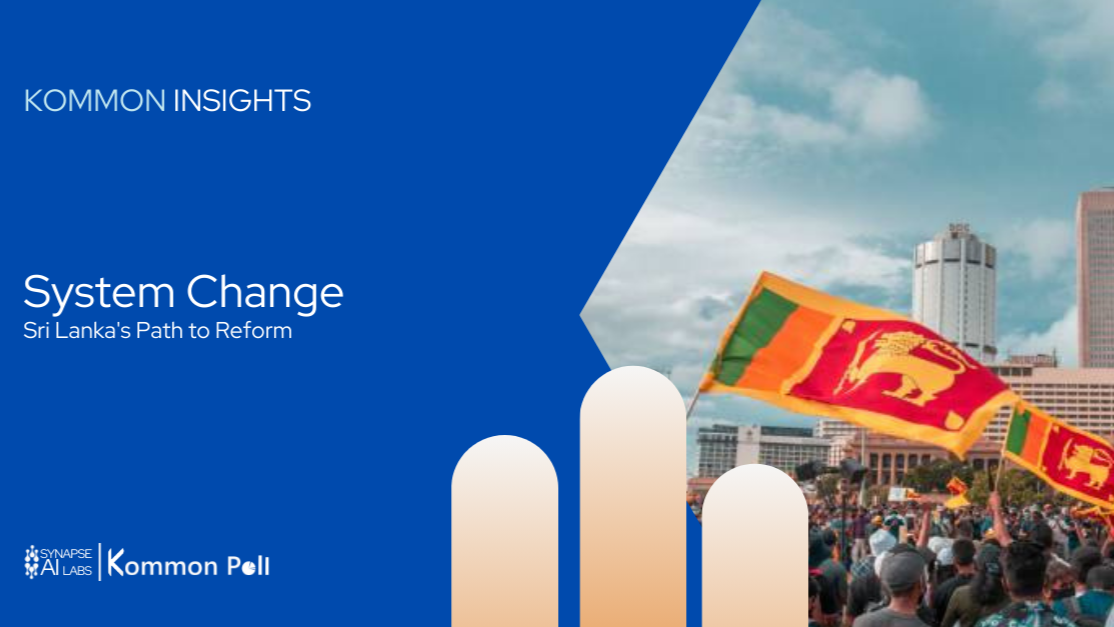In Sri Lanka, system change has frequently come up, especially during periods of political, economic, and social change. The changing expectations of the Sri Lankan people are reflected in these changes, which are frequently brought on by national crises or changes in leadership. System change has been implemented to address social inequity, economic instability, and inefficiencies in government over time. The goal of a more open and accountable system is at the core of these reforms. Here, we examine some of the most significant shifts that have molded the country, how these changes meet public expectations, and how social media is essential to driving public discussion.
The Fluctuation of Public Interest

In early 2024, discussions about systemic change surged, with a significant spike toward the end of January driven by Anura Kumara’s speeches and NPP’s content advocating for system change. Their messaging struck a chord with the public, sparking widespread online engagement and intensifying the national dialogue on the need for political and social transformation. This enthusiasm peaked during the September presidential election, where Anura Kumara Dissanayake’s anti-corruption and reform-focused campaign sparked optimism. However, post-election, these discussions faded as media focus shifted and immediate crises appeared to stabilize.
In November, the parliamentary elections sparked renewed conversations around systemic change, although the intensity of discussions was somewhat muted due to growing skepticism about the fulfillment of promises made during the campaign. However, in December, the discussions gained significant momentum with the announcement of the “Clean Sri Lanka” initiative, drawing heightened attention and increasing public engagement.
The launch of the Clean Sri Lanka initiative on January 1, 2025, further energized these discussions, sparking widespread conversations about sustainability and efficient governance. Backed by prominent figures, the initiative emphasized collective responsibility and became a catalyst for renewed public dialogue, reigniting interest in meaningful reforms across various platforms.
As the year progresses, the pattern emerging from these conversations shows a steady buildup of momentum, with public interest and engagement now focused on sustaining this drive for systemic change and pushing for meaningful, lasting reforms.
Public Expectations

The key phrases surrounding “අරගලය” (struggle) and “සැබෑ අරගලය ” (real struggle) in Sri Lanka reflect a complex blend of public expectations, frustrations, and aspirations. Words like “එකම නායකයා” symbolizes the people’s aspirations and the influence of their choices in shaping focused reforms, “ජනතාව“ emphasizes the need for broader participation to address the root causes of systemic issues. Together, these terms reflect a deep desire for reforms that pave the way for lasting and meaningful impact through a united effort between a visionary leader and the active involvement of the public. The inclusion of “ජනාධිපතිතුමා” (President) highlights the central role of leadership in public discourse, as citizens focus on the presidency’s influence in either driving or hindering transformative change.
Amid this call for reform, “දියුණු රටක්” (developed nation) stands out as a unifying aspiration, symbolizing a collective vision for a prosperous Sri Lanka that thrives economically, socially, and politically. It reflects the public’s hope to move beyond challenges like corruption, inefficiency, and inequality. However, an undercurrent of skepticism remains, as citizens demand tangible outcomes instead of unfulfilled promises. This mixture of hope and doubt fuels a dynamic conversation, with citizens continually pushing for systemic change, yet questioning whether progress can be sustained as new leadership emerges or election cycles unfold. This recurring pattern of optimism and disillusionment highlights the need for a more consistent and transparent approach to reforms.
The Role of social media

The trending hashtags reflect the significant role social media plays in shaping conversations about political and social change in Sri Lanka. Prominent tags like #SystemChange, #SajithForPresident, #NPP and #Ranil2024 highlight how digital platforms are being used to discuss leadership, reforms, and accountability. Hashtags such as #FiveYearMission, #SriLankaFirst, and #PuluwanSriLanka show a collective focus on the nation’s future and reform initiatives. Additionally, topics related to freedom and rights, like #FreedomOfSpeech and #FreedomOfAssembly, emphasize the public’s demand for democratic values and transparency.
These digital movements foster collective action, allowing citizens to connect, share experiences, and amplify their voices. While platforms like these enable advocacy and sustain momentum for change, they also bring challenges like misinformation and fragmented dialogue. Nevertheless, the hashtag trends demonstrate how social media empowers people to engage in discussions about leadership, reforms, and systemic change, amplifying public voices and fostering accountability. It serves as a dynamic platform for collective action and shaping national discourse.
Moving Forward
System change in Sri Lanka is a dynamic and multifaceted process that spans political, economic, and cultural dimensions. Key moments in the nation’s history have highlighted both the potential and challenges of transformative reforms. As Sri Lanka moves forward, the interplay between public aspirations, systemic reforms, and digital activism will play a crucial role in shaping the nation’s future. To sustain momentum, it is essential that reform efforts go beyond election cycles, Key events, Fresh Initiatives and become ingrained in the ongoing political discourse, with citizens continuously holding leaders accountable.
As we celebrate Independence Day, let us reflect on the resilience and unity that define us as a nation. May this day serve as a reminder of our shared aspirations and the enduring hope for meaningful, lasting change. Happy Independence Day, Sri Lanka!




